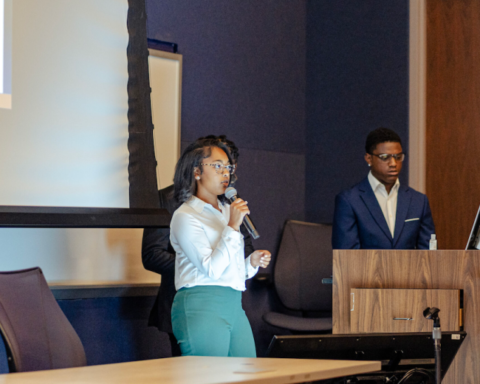By Donovan Dooley
After the police murder of George Floyd sparked one of the most significant racial awakenings in this country’s history, major companies responded in part by pouring tens of billions of dollars into fighting racial inequality. Approximately 24 months later, that momentum has seemingly slowed significantly.
While it’s become abundantly clear that the monetary commitment from corporate America has been impactful, the need for investment in the next generation of Black talent remains vital.
One way to bridge that opportunity is to forge a deeper connection to the community. For a number of corporations, establishing that connection starts at HBCUs. These epicenters of young Black excellence continue to be a resource for corporate America as companies increasingly create and strengthen their partnerships with these institutions.
For instance, IBM recently announced that it plans to establish Cybersecurity Leadership Centers at six HBCUs: North Carolina A&T State University, Southern University System, Clark Atlanta University, Xavier University of Louisiana, Morgan State University, and South Carolina State University. The multi-year cybersecurity experience will be comprised of technological protection curricula that include courses to help each institution enhance its cybersecurity education portfolios, cloud access for both faculty and students as well as an immersive learning initiative through which students and faculty can gain experience from realistic simulations.
“Going beyond dollar contributions, what are the real things that people need to know and be able to do to compete for jobs in the market,” Lydia Logan, IBM Global Vice President for Education and Workforce Development, recently said in a conversation with NewsOne. “We wanted to make sure that we were making available the resources that would matter.”
Black people have historically been left behind in too many industries due to discrimination and lack of resources. That’s especially true when it comes to the technology field. As the world becomes progressively more digital, the need for cybersecurity jobs will only increase and could provide more opportunities for young Black talent with the help of corporate investments to help take Black talent to the next levels.
“This is not just about what IBM is giving, this is about building a partnership,” Logan explained. “We really started with what can we do together? What can we provide for students, faculty, and the university that will provide lasting capacity to provide development of top talent for years to come?”
Target is another company that has taken a significant step in providing resources for Black students to bridge the opportunity gap. Earlier this month, the big box department store chain announced that it plans to enhance its investment in its scholarship for nearly 1,000 Black students entering college as freshmen at HBCUs. The Target Scholars program was established last year in partnership with the United Negro College Fund (UNCF) and works to support students focused on technology, design and leadership. Target said it is now providing scholarship extensions of $10,000 over the next three years to each of the students who just completed their freshman years and will now have access to more financial assistance and resources.
Besides a $10 million additional investment, Target Scholars are set to receive support from UNCF college success coaches and will have access to key resources like mentoring, workshops and internship opportunities.
Black students on average are still graduating with $25,000 more in student debt than their white counterparts. And according to a study by Real Estate Witch, the starting salary for recent graduates is around $55,000. This means many new Black college graduates are nearly guaranteed to struggle to make their student loan payments each month while combating inflation. The study went on to point out that just 51% of students who had jobs set up before they graduate are pleased with their starting salaries. Nearly half of these students are graduating with at least $30,000 in student debt, with close to 30% graduating with $50,000 or more in debt.
Damu McCoy, Target Vice President of Talent Acquisition, told NewsOne that those statistics show just how important the investments of these major corporations can be in providing Black students a chance to start their careers with advanced skills and prospects of the kind of financial security their peers may not have.
“Sometimes when people think about talent, there is this extraction mentality instead of an investment mentality,” McCoy said. “How do you extract from communities and get them to come to where you are? Instead of ‘how do you invest in the communities you want to see thrive?’”
East Dockery, who earned a degree in multimedia journalism from North Carolina A&T State University and worked with ESPN, NBC and TNT before graduating this year, echoed similar sentiments and emphasized the importance of HBCU talent and why the investment in young Black talents can’t stop now.
“When corporations invest into providing opportunities for HBCU talent they are investing in the culture. Which is beneficial not only for their company but for the students as well bc it allows them to showcase all the skills that they have possessed in college,“ said Dockery. “It takes more than a couple recruitment sessions and sending out your favorite DEI (diversity, equity and inclusion) hire to talk to us. It takes thorough campus visits and fellowships catered specifically to HBCU students and follow-ups with students you see potential in.”
McCoy continued: “It’s important that there is a broader and more supported pipeline of Black leaders. Everyone knows the stats that we are underrepresented in many spaces and places. You have to invest at every level… both in making sure there is a robust pipeline and in the folks that sit inside your organization to make sure they have viable careers and support to be successful.”
Investment in Black talent will need to be a point of emphasis for major corporations to chip away at economic discrimination and racial inequality for the next generation. HBCUs will play an undeniable role in this transformation as they nurture young Black talent in environments that push these students to achieve success.
Logan, of IBM, underscored that point.
“HBCUs are gems of the United States,” Logan said. “And we want to do our part to make sure that they continue to hold that place in our country.”





